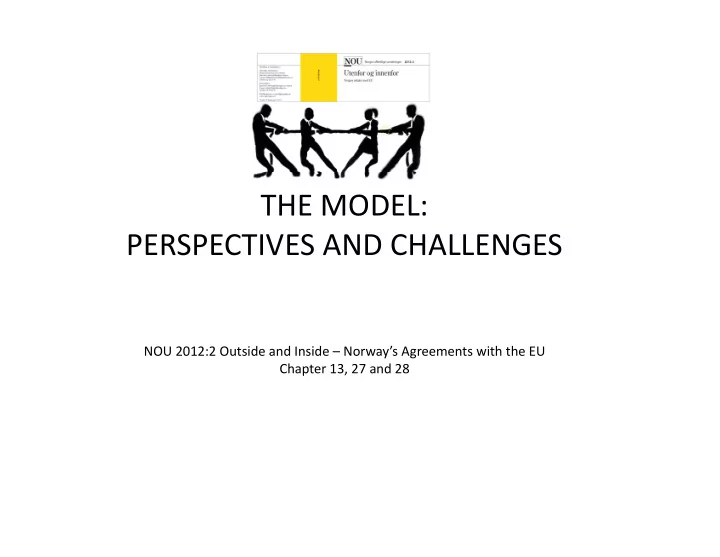

THE MODEL: PERSPECTIVES AND CHALLENGES PERSPECTIVES AND CHALLENGES NOU 2012:2 Outside and Inside – Norway’s Agreements with the EU Chapter 13, 27 and 28
THE MODEL? 1) Perspectives 1) Perspectives 2) Features of the model 3) Challenges ) g
VIEW FROM THE EU The only problem with Norway is that there is no problem The only problem with Norway is that there is no problem….. Well functioning agreement • Concerned with ensuring homogeneity g g y Welcome further co-operation • Privileged partnership 2012 - Review of how EU’s interest are served
THE EFTA PARTNERS Strange bed-fellows: • Few mutual interests • Few (if any) historical traditions for co-operation Bound together in the EFTA/EEA agreements Bound together in the EFTA/EEA agreements • Shared institutions • Interdependencies
ICELAND AND LIECHTENSTEIN Positive experiences of the EEA Agreement Positive experiences of the EEA Agreement • Protected interests and values The EEA/EFTA cooperation has functioned well But not without frictions • Differences in interests, capacities, and domestic procedures N Norway: Acting as a “great” power A ti “ t”
EEA - WHO IS SHE? EEA - WHO IS SHE?
MODEL FEATURES I Extensive Extensive No coherent institutional framework – patchwork No special material content (EU law) p ( ) • Association agreements
MODEL FEATURES II Dynamic Dynamic No time limit - open-ended delegation Reactive – Asymmetric - No agenda-setting y g g
MODEL FEATURES III Discrepancy between formal and actual sovereignty Discrepancy between formal and actual sovereignty Domestic compromise – second best Depoliticizing p g Mask the true nature of the relation
A PECULIAR MODE OF ASSOCIATION Unique model: Unique model: • Rare in international relations (Puerto Rico?) Others have found it unattractive No attempt at promoting the model to others
SOME CHALLENGES
THE POLITICO- ADMINISTRATIVE CHALLENGE Lack of political involvement and leadership Few incentives for the administration Weak co-ordination Weak co-ordination Increasingly difficult to ensure participation and influence at early stages Knowledge and competence
DEVELOPMENTS IN THE EU Power and attention: Asymmetry: 27:3 500:5 Crisis The changing institutional balance in the EU Th h i i tit ti l b l i th EU Abolishment of the pillar structure • Assessing relevance • Assessing relevance Agencies EEAS
GENERAL CHALLENGES IN EFTA/EEA Iceland, Liechtenstein and Norway • Few shared interests • Limited capacity Limited capacity • Bilateral or EFTA-track? Number of member states? Exit Iceland?? Welcome ?
THE EFTA SECRETARIAT Important for the daily working of the EEA • More important for the smaller EFTA- member states • Limited powers • High turnover • High turnover • Ignored in the public debate
EFTA SURVEILLANCE AUTHORITY Critical for the functioning of the EEA Balancing different roles: • Advising • Advising • Negotiating • Monitoring
EFTA COURT Critical for the functioning of the EEA EEA • Few cases • • Small Small • National courts have referred few cases to the EFTA court • In support of the reform proposals from the EFTA court
FINANCIAL MECHANISM OFFICE Support for the financial mechanisms • Phasing-out AND Phasing-in • Rapid growth – a controlled expansion? expansion? • Autonomy or instrument?
SOME IDEAS FOR REFORM Comprehensive framework? Comprehensive framework? • All agreements? • Justice and Home affairs? • Foreign and security policy? Financial mechanism? Evaluating and reforming the EEA institutions? Evaluating and reforming the EEA institutions?
Recommend
More recommend